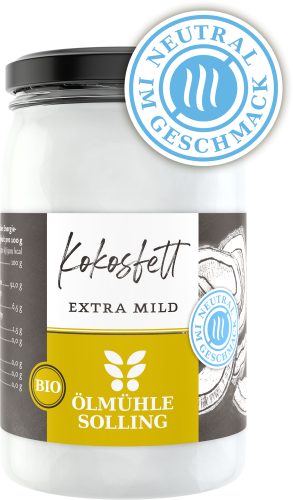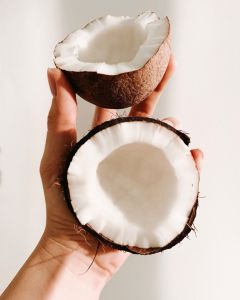ORGANIC Coconut oil
virgin


- neutral in taste and odour (deodorized)
- mildly steamed
- versatile in use
- can be heated to a very high temperature
from 109 ratings




The tasteless and odourless coconut oil comes from fully ripe organic coconuts from the Philippines. It is gently extracted from the dried pulp (copra) of the coconut and then gently deodorized using steam.
Difference to virgin coconut oil: processing and taste
Mildly steamed coconut fat does not differ significantly from virgin coconut oil in terms of nutritional physiology. The main difference lies in the processing and in the taste and smell. In contrast to virgin coconut oil, which has an intense coconut aroma and taste, deodorized coconut fat is tasteless and odourless.
We deliberately do not use any chemical processes in the deodorization process. The deodorization of the coconut fat is purely mechanical and takes place exclusively with the help of steam. The gentle steaming of the coconut fat removes the typical flavors and aromas of the coconut. Deodorized coconut fat is therefore particularly suitable for the preparation of dishes that are not to have a coconut note and at the same time the high heatability of the fat is important for preparation.
Coconut fat is heat-resistant
Both virgin and deodorized coconut fat have similar heat-resistant properties, as they consist mainly of saturated fatty acids. Saturated fatty acids are more stable at high temperatures compared to unsaturated fatty acids. Coconut oil has a high smoke point, which is the point at which the oil begins to smoke and decompose. It is usually between 177 °C and 204 °C. For this reason, both virgin and deodorized coconut oil are excellent for cooking, frying, baking and grilling. They retain their stability and nutrients relatively well even when heated. In principle, however, oils should not be heated above their smoke point, as this can lead to the formation of harmful substances.

Tree of Life supplies nuts with valuable ingredients
In terms of nutritional composition, both virgin and deodorized coconut fat contain similar amounts of saturated fatty acids, especially medium chain triglycerides (MCTs). MCTs are considered easily digestible fats that can be quickly converted into energy by the body. Coconuts are a very nutritious food, they contain fiber, vitamins and minerals. In addition to the nuts, the coconut palm also provides fuel and building material. This is why it is called the Tree of Life, as it is considered the most important crop in the tropics.
Virgin or deodorized: A personal decision
The choice between virgin and deodorized coconut oil depends on personal preferences and requirements. If the taste and smell of coconut oil is important to you, choose a virgin coconut oil. Deodorized coconut oil is an optimal option for those who want the benefits of coconut oil but want to avoid the coconut taste and smell.
Solid and liquid: A question of temperature
At room temperature, coconut oil is normally solid. The melting point is usually between 24°C and 26°C. If the ambient temperature is above this point, the coconut oil begins to melt and becomes liquid. It is often assumed that coconut fat is always solid and coconut oil is always liquid. In principle, coconut fat and coconut oil are not different products. The consistency of coconut fat has no influence on its quality and usability.
Production of coconut fat: particularly sustainable
Coconut fat is made from ripe coconuts. The outer shell of the coconut is first removed by hand and then the flesh is extracted. The pulp is then shredded into grated coconut, which is then dried. The dried pulp is known as copra. Once the coconut fat has been carefully produced, it is gently steamed to produce deodorized coconut fat.
The production of coconut oil is particularly sustainable, as there is no waste and every part of the valuable product is used.
- The press cake is processed into fine organic coconut flour.
- The coconut puree, which remains in the barrel as sediment, is bottled and used as a delicious spread.
In addition to the deodorized coconut fat, the organic manufactory also offers two virgin coconut oils: Naturland Fair organic coconut oil, in which the seed skin is also processed, and virgin organic coconut oil, which is produced without the seed skin. In addition, the sweet, caramelized coconut blossom sugar is made from the nectar of the coconut blossom bud.
Usage
Gently steamed coconut oil is ideal for applications where the typical taste should not be affected, such as savory dishes, stews and soups, vegetable and fish dishes or desserts. Coconut oil is particularly heat-resistant. It is ideal for frying, baking and deep-frying. It is also a fine ingredient in sauces.





 Coconut oil
Coconut oil Coconut oil
Coconut oil Coconut butter
Coconut butter